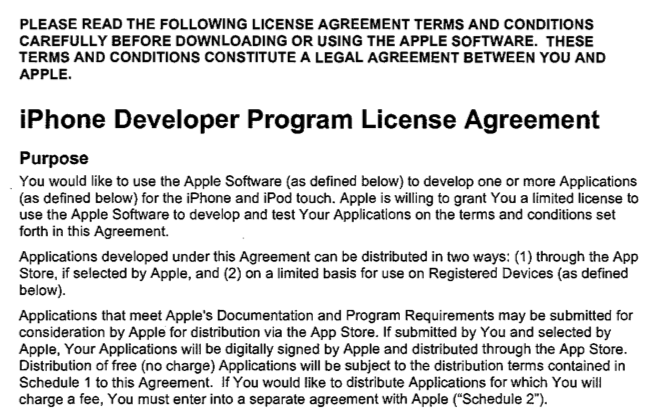The foundation came to the conclusion that by controlling the App Store and preventing rival competition by blocking competing options, Apple's "future of computing" is headed towards an era that could stifle innovation. It suggested the Cupertino, Calif., company's actions have been that of a "jealous and arbitrary feudal lord."
"Overall, the Agreement is a very one-sided contract, favoring Apple at every turn," the EFF wrote. "That's not unusual where end-user license agreements are concerned (and not all the terms may ultimately be enforceable), but it's a bit of a surprise as applied to the more than 100,000 developers for the iPhone, including many large public companies.
"How can Apple get away with it? Because it is the sole gateway to the more than 40 million iPhones that have been sold. In other words, it's only because Apple still "owns" the customer, long after each iPhone (and soon, iPad) is sold, that it is able to push these contractual terms on the entire universe of software developers for the platform."
The EFF noted that public copies of the license agreement are "scarce," in part because the agreement itself prohibits its release. The foundation managed to obtain a copy by making a request to NASA under the U.S. Freedom of Information Act, and presented what it felt were "a few troubling highlights." They include:
- Developers, including government agencies such as NASA, cannot make public statements about the iPhone OS developer agreement.
- Applications created through the development kit can be sold on the App Store only.
- The iPhone OS cannot be reverse engineered, and the foundation asserts this even applies to methods that courts have recognized as fair use.
- Apple can remove an application at any time. In 2008, a researcher discovered a "kill switch" in the iPhone software that would allow the company to remotely deactivate an application.
- No matter what, Apple is never liable to a developer for more than $50 in damages. "That's pretty remarkable," the foundation said, "considering that Apple holds a developer's reputational and commercial value in its hands — it's not as though the developer can reach its existing customers anywhere else."
The EFF has posted the iPhone OS developer agreement in its entirety, weighing in at just over 680Kb, on its Web site.
It isn't the first time the EFF has been outspoken against Apple. A year ago, the foundation and the iPhone maker fought with the U.S. Copyright Office over the act of "jailbreaking" the iPhone, a process which allows users to run unauthorized code. Soon after, Mozilla and Skype added their support for the EFF's motion for an exemption in the Digital Millennium Copyright Act for jailbreaking.
The EFF also served as counsel for both AppleInsider and PowerPage after Apple attempted to force the Web sites to identify sources who provided accurate details of an unreleased hardware product, code-named Asteroid. A three-judge panel in the California Court of Appeals sided in favor of the Web sites and ruled that they were entitled to the same protections as conventional reporters.
Though the App Store for the iPhone, iPod touch and iPad has been tremendously successful with over 3 billion downloads and 140,000 software options, Apple has also been criticized for leveraging total control over the download destination. In recent weeks the company has revised its policies and removed previously accepted applications that it felt contained overtly sexual content, and has also begun to crack down on the approval of software with minimum user functionality.
Apple's purge of sexual content from the App Store axed more than 5,000 applications and even mistakenly affected a swimsuit seller, though the situation was rectified in less than a week. Phil Schiller, head of worldwide product marketing for Apple, said his company wanted to make sure the App Store did not scare off potential customers, as numerous parents had become upset with what their children could access on the iPhone and iPod touch.
Though thousands of adult applications were removed from the App Store, some risque content from brands such as Playboy and Sports Illustrated remains for sale. Schiller said that those brands represent well-known companies with "previously published material available broadly in a well-accepted format," which is why they remain for sale.
 Sam Oliver
Sam Oliver







-m.jpg)






 Andrew Orr
Andrew Orr
 Amber Neely
Amber Neely
 Marko Zivkovic
Marko Zivkovic
 William Gallagher and Mike Wuerthele
William Gallagher and Mike Wuerthele



 Mike Wuerthele
Mike Wuerthele








119 Comments
The EFF is barking up the wrong tree on this one.
The "open" alternatives to the iPhone aren't panning out, so Apple's closed model is vilified. Too funny.
Yet virtually every developer and their dog seems to be choosing Apple's "closed" and "controlled" model. Interesting.
Apple can remove an application at any time. In 2008, a researcher discovered a "kill switch" in the iPhone software that would allow the company to remotely deactivate an application.
Oh that's so wrong of them! Someone releases an app that turns out to be malicious and apple can kill it remotely! WTF is wrong with them BAD APPLE!
The EFF is barking up the wrong tree on this one.
The "open" alternatives to the iPhone aren't panning out, so Apple's closed model is vilified. Too funny.
Yet virtually every developer and their dog seems to be choosing Apple's "closed" and "controlled" model. Interesting.
How are the alternatives not panning out? Last I've read, despite all the issues of "fragmentation", the Android Market shows no signs of shrinking or stopping. Only growth.
Apple can remove an application at any time. In 2008, a researcher discovered a "kill switch" in the iPhone software that would allow the company to remotely deactivate an application.
Oh that's so wrong of them! Someone releases an app that turns out to be malicious and apple can kill it remotely! WTF is wrong with them BAD APPLE!
I don't think it's as much about that as it is just the idea that they have to agree to a term where if Apple executives wake up one and and feel they don't like your app (for whatever reason), they can remotely kill it across every iPhone/iPod/iPad that accesses the App Store. Even if the app is non-malicious.
Yes, my example is reaching, but that's probably exactly what the little voice in the back of the developers' mind says when they read it.
Were people expecting anything else from them?
Oh puhleeeze . . . the privacy sky is falling again!